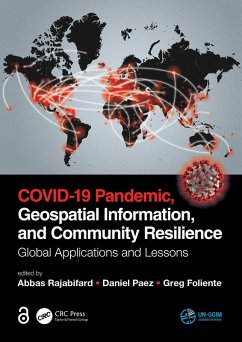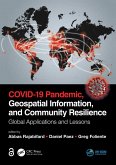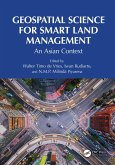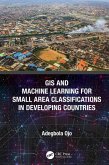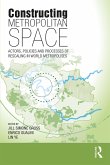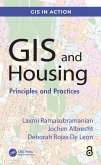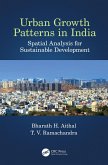COVID-19 Pandemic, Geospatial Information, and Community Resilience (eBook, PDF)
Global Applications and Lessons
Redaktion: Rajabifard, Abbas; Foliente, Greg; Paez, Daniel
0,00 €
0,00 €
inkl. MwSt.
Sofort per Download lieferbar

0 °P sammeln
0,00 €
Als Download kaufen

0,00 €
inkl. MwSt.
Sofort per Download lieferbar

0 °P sammeln
Jetzt verschenken
Alle Infos zum eBook verschenken
0,00 €
inkl. MwSt.
Sofort per Download lieferbar
Alle Infos zum eBook verschenken

0 °P sammeln
COVID-19 Pandemic, Geospatial Information, and Community Resilience (eBook, PDF)
Global Applications and Lessons
Redaktion: Rajabifard, Abbas; Foliente, Greg; Paez, Daniel
- Format: PDF
- Merkliste
- Auf die Merkliste
- Bewerten Bewerten
- Teilen
- Produkt teilen
- Produkterinnerung
- Produkterinnerung

Bitte loggen Sie sich zunächst in Ihr Kundenkonto ein oder registrieren Sie sich bei
bücher.de, um das eBook-Abo tolino select nutzen zu können.
Hier können Sie sich einloggen
Hier können Sie sich einloggen
Sie sind bereits eingeloggt. Klicken Sie auf 2. tolino select Abo, um fortzufahren.

Bitte loggen Sie sich zunächst in Ihr Kundenkonto ein oder registrieren Sie sich bei bücher.de, um das eBook-Abo tolino select nutzen zu können.
Understanding pandemic resilience requires input from different disciplines. This book, with worldwide contributions examining the COVID-19 pandemic, provides interdisciplinary analysis and multi-sector expertise on the use of geospatial information and location intelligence to support community resilience and the management of pandemics.
- Geräte: PC
- ohne Kopierschutz
- eBook Hilfe
- Größe: 131.17MB
Andere Kunden interessierten sich auch für
![COVID-19 Pandemic, Geospatial Information, and Community Resilience (eBook, ePUB) COVID-19 Pandemic, Geospatial Information, and Community Resilience (eBook, ePUB)]() COVID-19 Pandemic, Geospatial Information, and Community Resilience (eBook, ePUB)0,00 €
COVID-19 Pandemic, Geospatial Information, and Community Resilience (eBook, ePUB)0,00 €![Geospatial Science for Smart Land Management (eBook, PDF) Geospatial Science for Smart Land Management (eBook, PDF)]() Geospatial Science for Smart Land Management (eBook, PDF)173,95 €
Geospatial Science for Smart Land Management (eBook, PDF)173,95 €![GIS and Machine Learning for Small Area Classifications in Developing Countries (eBook, PDF) GIS and Machine Learning for Small Area Classifications in Developing Countries (eBook, PDF)]() Adegbola OjoGIS and Machine Learning for Small Area Classifications in Developing Countries (eBook, PDF)52,95 €
Adegbola OjoGIS and Machine Learning for Small Area Classifications in Developing Countries (eBook, PDF)52,95 €![Geospatial Technology for Sustainable Oil Palm Industry (eBook, PDF) Geospatial Technology for Sustainable Oil Palm Industry (eBook, PDF)]() Kasturi KanniahGeospatial Technology for Sustainable Oil Palm Industry (eBook, PDF)126,95 €
Kasturi KanniahGeospatial Technology for Sustainable Oil Palm Industry (eBook, PDF)126,95 €![Constructing Metropolitan Space (eBook, PDF) Constructing Metropolitan Space (eBook, PDF)]() Constructing Metropolitan Space (eBook, PDF)53,95 €
Constructing Metropolitan Space (eBook, PDF)53,95 €![GIS and Housing (eBook, PDF) GIS and Housing (eBook, PDF)]() Laxmi RamasubramanianGIS and Housing (eBook, PDF)0,00 €
Laxmi RamasubramanianGIS and Housing (eBook, PDF)0,00 €![Urban Growth Patterns in India (eBook, PDF) Urban Growth Patterns in India (eBook, PDF)]() Urban Growth Patterns in India (eBook, PDF)48,95 €
Urban Growth Patterns in India (eBook, PDF)48,95 €-
-
-
Understanding pandemic resilience requires input from different disciplines. This book, with worldwide contributions examining the COVID-19 pandemic, provides interdisciplinary analysis and multi-sector expertise on the use of geospatial information and location intelligence to support community resilience and the management of pandemics.
Dieser Download kann aus rechtlichen Gründen nur mit Rechnungsadresse in A, B, BG, CY, CZ, D, DK, EW, E, FIN, F, GR, HR, H, IRL, I, LT, L, LR, M, NL, PL, P, R, S, SLO, SK ausgeliefert werden.
Produktdetails
- Produktdetails
- Verlag: Taylor & Francis eBooks
- Seitenzahl: 558
- Erscheinungstermin: 7. Juni 2021
- Englisch
- ISBN-13: 9781000402926
- Artikelnr.: 62014728
- Verlag: Taylor & Francis eBooks
- Seitenzahl: 558
- Erscheinungstermin: 7. Juni 2021
- Englisch
- ISBN-13: 9781000402926
- Artikelnr.: 62014728
- Herstellerkennzeichnung Die Herstellerinformationen sind derzeit nicht verfügbar.
Professor Abbas Rajabifard is an internationally recognised scholar and geospatial engineer. He is an active leader in land administration modernisation and geospatial enablement and disaster resilience, and his passion is in the field of research and innovation to serve global community. He is Director of Smart and Sustainable Development and Academic Lead Infrastructure platform in the Faculty of Engineering and IT at The University of Melbourne. He is a member of International Advisory Board and former Chair UN-GGIM Academic Network. He is also Director of the Centre for Spatial Data Infrastructures & Land Administration (CSDILA). From 2013 to 2020 he was the Director of Centre for Disaster Management and Public Safety at the University of Melbourne. Prof. Rajabifard has active research in the areas of digital twin, sustainability and resilience, location intelligence, SDI, land administration modernisation, urban analytics, spatial enabled government and societies, disaster management, 3D visualisation and urban analytics, and SDGs.
Part I: Setting the Scene. The Role and Value of Geospatial Information and
Technology in a Pandemic. Part II: Technical and Techno-Social Solutions.
Land Administration and Authoritative Geospatial Information: Lessons from
Disasters to Support Building Resilience to Pandemics. Open Geospatial Data
for Responding to the COVID-19 Challenge. Remote Sensing and Computational
Epidemiology. The Potential of Drone Technology in Pandemics. The Role of
Neighborhood Social and Built Environments on Social Interactions and
Community Wellbeing Through the COVID-19 Pandemic. Social Vulnerability to
COVID-19: Preliminary Indicators and Research Agenda. Informal Road
Detection and Uncertainty in Remote Sensing. Management and Analysis of
Maritime Geospatial Data During COVID-19: Case Studies, Opportunities and
Challenges. City Design and the Transmission of COVID-19. Sensing Community
Resilience Using Social Media. Role of the Professional Body in a Pandemic.
OpenStreetMap Data Use Cases During the Early Months of the COVID-19
Pandemic. Utilization of Geospatial Network Analysis Technique for Optimal
Route Planning During COVID-19 Pandemic. Formalizing Informal Settlements
to Empower Residents Against COVID-19 and Other Disasters. Spatially
Enabled COVID-19: A Review of Applications and Systems. COVID-19
Spatiotemporal Hotspots and Prediction Based on Wavelet and Neural Network.
Part III: Regional, Country and Local Applications. London in Lockdown:
Mobility in the Pandemic City. Americas' Geospatial Response to COVID-19.
Temporal Information Management to Control the COVID-19 Epidemic: Country
Perspectives in Europe. Practicing Online Higher Education Facilitated by
ICT In China: In The Context Of COVID-19 Pandemic. Time-Series Analysis of
COVID-19 in Iran: A Remote Sensing Perspective. "Creating a Set of
High-Resolution Vulnerability Indicators to Support the Disaster Management
Response to the COVID-19 Pandemic in South Africa". Rapid Development of
Location-based Apps: Saving Lives during a Pandemic - the South Korean
Experience. Spatial Analysis of Urban Parks and COVID-19: City of
Whittlesea, Victoria, Australia. The Economic Impact of COVID-19 in Pacific
Island Countries and Territories. Promoting Resilience While Mitigating
Disease Transmission: An Australian COVID-19 Study. Impacts of COVID-19
lockdown restrictions on housing and public space use and adaptation: Urban
proximity, public health, and vulnerability in three Latin American cities.
Use of Geospatial Information and Technologies in Understanding the
COVID-19 Pandemic in Canada: Examples and Critical Discussion. Geospatial
Intelligence in Dealing with COVID-19 Challenges in Czechia. COVID-19 in
France: A Multiphase and Multidimensional Approach to a Complex Societal
Imbalance. Part IV: Stakeholder Perspectives. Digital Earth: A World
Infrastructure for Sustaining Resilience in Complex Pandemic Scenarios.
COVID-19: The Open Data Pandemic. The Challenge of Mapping COVID-19 Data.
Better Engagement to Build Smarter, Resilient Communities. How the
Coronavirus Could Change Urban Planning. Toward Agile Strategies for
Enhancing Community Resilience Following the COVID-19 Pandemic: An
Interview Study. COVID-19 Pandemic in Finland: Converting a Forced
Digitalisation into an Opportunity. What's the Future of Greek Cities in
the Post-COVID-19 Period? New Perspectives on Urban Resilience and
Sustainable Mobility. COVID-19 Pandemic Challenges and Impacts on the SDGs
2030: Indian Perspective. The Value of a Policy-Responsive Research Funding
Model: The Geohealth Laboratory Collaboration in New Zealand. Pandemic and
the City: A Melbourne Perspective for Community Resilience. Spatial
Modelling Concepts for Controlling COVID-19 Risk in Saudi Arabia. COVID-19
in Spain and the Use of Geospatial Information. Lessons Learned from
COVIDSafe: Understanding Conditions for Successful Implementation of Track
and Trace Technologies. Sustainable Transport as a Key Pillar to Community
Resilience During the COVID-19 Pandemic. Part V: The Future Direction.
Preparing for the next pandemic: Geospatial information for enhanced
community resilience.
Technology in a Pandemic. Part II: Technical and Techno-Social Solutions.
Land Administration and Authoritative Geospatial Information: Lessons from
Disasters to Support Building Resilience to Pandemics. Open Geospatial Data
for Responding to the COVID-19 Challenge. Remote Sensing and Computational
Epidemiology. The Potential of Drone Technology in Pandemics. The Role of
Neighborhood Social and Built Environments on Social Interactions and
Community Wellbeing Through the COVID-19 Pandemic. Social Vulnerability to
COVID-19: Preliminary Indicators and Research Agenda. Informal Road
Detection and Uncertainty in Remote Sensing. Management and Analysis of
Maritime Geospatial Data During COVID-19: Case Studies, Opportunities and
Challenges. City Design and the Transmission of COVID-19. Sensing Community
Resilience Using Social Media. Role of the Professional Body in a Pandemic.
OpenStreetMap Data Use Cases During the Early Months of the COVID-19
Pandemic. Utilization of Geospatial Network Analysis Technique for Optimal
Route Planning During COVID-19 Pandemic. Formalizing Informal Settlements
to Empower Residents Against COVID-19 and Other Disasters. Spatially
Enabled COVID-19: A Review of Applications and Systems. COVID-19
Spatiotemporal Hotspots and Prediction Based on Wavelet and Neural Network.
Part III: Regional, Country and Local Applications. London in Lockdown:
Mobility in the Pandemic City. Americas' Geospatial Response to COVID-19.
Temporal Information Management to Control the COVID-19 Epidemic: Country
Perspectives in Europe. Practicing Online Higher Education Facilitated by
ICT In China: In The Context Of COVID-19 Pandemic. Time-Series Analysis of
COVID-19 in Iran: A Remote Sensing Perspective. "Creating a Set of
High-Resolution Vulnerability Indicators to Support the Disaster Management
Response to the COVID-19 Pandemic in South Africa". Rapid Development of
Location-based Apps: Saving Lives during a Pandemic - the South Korean
Experience. Spatial Analysis of Urban Parks and COVID-19: City of
Whittlesea, Victoria, Australia. The Economic Impact of COVID-19 in Pacific
Island Countries and Territories. Promoting Resilience While Mitigating
Disease Transmission: An Australian COVID-19 Study. Impacts of COVID-19
lockdown restrictions on housing and public space use and adaptation: Urban
proximity, public health, and vulnerability in three Latin American cities.
Use of Geospatial Information and Technologies in Understanding the
COVID-19 Pandemic in Canada: Examples and Critical Discussion. Geospatial
Intelligence in Dealing with COVID-19 Challenges in Czechia. COVID-19 in
France: A Multiphase and Multidimensional Approach to a Complex Societal
Imbalance. Part IV: Stakeholder Perspectives. Digital Earth: A World
Infrastructure for Sustaining Resilience in Complex Pandemic Scenarios.
COVID-19: The Open Data Pandemic. The Challenge of Mapping COVID-19 Data.
Better Engagement to Build Smarter, Resilient Communities. How the
Coronavirus Could Change Urban Planning. Toward Agile Strategies for
Enhancing Community Resilience Following the COVID-19 Pandemic: An
Interview Study. COVID-19 Pandemic in Finland: Converting a Forced
Digitalisation into an Opportunity. What's the Future of Greek Cities in
the Post-COVID-19 Period? New Perspectives on Urban Resilience and
Sustainable Mobility. COVID-19 Pandemic Challenges and Impacts on the SDGs
2030: Indian Perspective. The Value of a Policy-Responsive Research Funding
Model: The Geohealth Laboratory Collaboration in New Zealand. Pandemic and
the City: A Melbourne Perspective for Community Resilience. Spatial
Modelling Concepts for Controlling COVID-19 Risk in Saudi Arabia. COVID-19
in Spain and the Use of Geospatial Information. Lessons Learned from
COVIDSafe: Understanding Conditions for Successful Implementation of Track
and Trace Technologies. Sustainable Transport as a Key Pillar to Community
Resilience During the COVID-19 Pandemic. Part V: The Future Direction.
Preparing for the next pandemic: Geospatial information for enhanced
community resilience.
Part I: Setting the Scene. The Role and Value of Geospatial Information and
Technology in a Pandemic. Part II: Technical and Techno-Social Solutions.
Land Administration and Authoritative Geospatial Information: Lessons from
Disasters to Support Building Resilience to Pandemics. Open Geospatial Data
for Responding to the COVID-19 Challenge. Remote Sensing and Computational
Epidemiology. The Potential of Drone Technology in Pandemics. The Role of
Neighborhood Social and Built Environments on Social Interactions and
Community Wellbeing Through the COVID-19 Pandemic. Social Vulnerability to
COVID-19: Preliminary Indicators and Research Agenda. Informal Road
Detection and Uncertainty in Remote Sensing. Management and Analysis of
Maritime Geospatial Data During COVID-19: Case Studies, Opportunities and
Challenges. City Design and the Transmission of COVID-19. Sensing Community
Resilience Using Social Media. Role of the Professional Body in a Pandemic.
OpenStreetMap Data Use Cases During the Early Months of the COVID-19
Pandemic. Utilization of Geospatial Network Analysis Technique for Optimal
Route Planning During COVID-19 Pandemic. Formalizing Informal Settlements
to Empower Residents Against COVID-19 and Other Disasters. Spatially
Enabled COVID-19: A Review of Applications and Systems. COVID-19
Spatiotemporal Hotspots and Prediction Based on Wavelet and Neural Network.
Part III: Regional, Country and Local Applications. London in Lockdown:
Mobility in the Pandemic City. Americas' Geospatial Response to COVID-19.
Temporal Information Management to Control the COVID-19 Epidemic: Country
Perspectives in Europe. Practicing Online Higher Education Facilitated by
ICT In China: In The Context Of COVID-19 Pandemic. Time-Series Analysis of
COVID-19 in Iran: A Remote Sensing Perspective. "Creating a Set of
High-Resolution Vulnerability Indicators to Support the Disaster Management
Response to the COVID-19 Pandemic in South Africa". Rapid Development of
Location-based Apps: Saving Lives during a Pandemic - the South Korean
Experience. Spatial Analysis of Urban Parks and COVID-19: City of
Whittlesea, Victoria, Australia. The Economic Impact of COVID-19 in Pacific
Island Countries and Territories. Promoting Resilience While Mitigating
Disease Transmission: An Australian COVID-19 Study. Impacts of COVID-19
lockdown restrictions on housing and public space use and adaptation: Urban
proximity, public health, and vulnerability in three Latin American cities.
Use of Geospatial Information and Technologies in Understanding the
COVID-19 Pandemic in Canada: Examples and Critical Discussion. Geospatial
Intelligence in Dealing with COVID-19 Challenges in Czechia. COVID-19 in
France: A Multiphase and Multidimensional Approach to a Complex Societal
Imbalance. Part IV: Stakeholder Perspectives. Digital Earth: A World
Infrastructure for Sustaining Resilience in Complex Pandemic Scenarios.
COVID-19: The Open Data Pandemic. The Challenge of Mapping COVID-19 Data.
Better Engagement to Build Smarter, Resilient Communities. How the
Coronavirus Could Change Urban Planning. Toward Agile Strategies for
Enhancing Community Resilience Following the COVID-19 Pandemic: An
Interview Study. COVID-19 Pandemic in Finland: Converting a Forced
Digitalisation into an Opportunity. What's the Future of Greek Cities in
the Post-COVID-19 Period? New Perspectives on Urban Resilience and
Sustainable Mobility. COVID-19 Pandemic Challenges and Impacts on the SDGs
2030: Indian Perspective. The Value of a Policy-Responsive Research Funding
Model: The Geohealth Laboratory Collaboration in New Zealand. Pandemic and
the City: A Melbourne Perspective for Community Resilience. Spatial
Modelling Concepts for Controlling COVID-19 Risk in Saudi Arabia. COVID-19
in Spain and the Use of Geospatial Information. Lessons Learned from
COVIDSafe: Understanding Conditions for Successful Implementation of Track
and Trace Technologies. Sustainable Transport as a Key Pillar to Community
Resilience During the COVID-19 Pandemic. Part V: The Future Direction.
Preparing for the next pandemic: Geospatial information for enhanced
community resilience.
Technology in a Pandemic. Part II: Technical and Techno-Social Solutions.
Land Administration and Authoritative Geospatial Information: Lessons from
Disasters to Support Building Resilience to Pandemics. Open Geospatial Data
for Responding to the COVID-19 Challenge. Remote Sensing and Computational
Epidemiology. The Potential of Drone Technology in Pandemics. The Role of
Neighborhood Social and Built Environments on Social Interactions and
Community Wellbeing Through the COVID-19 Pandemic. Social Vulnerability to
COVID-19: Preliminary Indicators and Research Agenda. Informal Road
Detection and Uncertainty in Remote Sensing. Management and Analysis of
Maritime Geospatial Data During COVID-19: Case Studies, Opportunities and
Challenges. City Design and the Transmission of COVID-19. Sensing Community
Resilience Using Social Media. Role of the Professional Body in a Pandemic.
OpenStreetMap Data Use Cases During the Early Months of the COVID-19
Pandemic. Utilization of Geospatial Network Analysis Technique for Optimal
Route Planning During COVID-19 Pandemic. Formalizing Informal Settlements
to Empower Residents Against COVID-19 and Other Disasters. Spatially
Enabled COVID-19: A Review of Applications and Systems. COVID-19
Spatiotemporal Hotspots and Prediction Based on Wavelet and Neural Network.
Part III: Regional, Country and Local Applications. London in Lockdown:
Mobility in the Pandemic City. Americas' Geospatial Response to COVID-19.
Temporal Information Management to Control the COVID-19 Epidemic: Country
Perspectives in Europe. Practicing Online Higher Education Facilitated by
ICT In China: In The Context Of COVID-19 Pandemic. Time-Series Analysis of
COVID-19 in Iran: A Remote Sensing Perspective. "Creating a Set of
High-Resolution Vulnerability Indicators to Support the Disaster Management
Response to the COVID-19 Pandemic in South Africa". Rapid Development of
Location-based Apps: Saving Lives during a Pandemic - the South Korean
Experience. Spatial Analysis of Urban Parks and COVID-19: City of
Whittlesea, Victoria, Australia. The Economic Impact of COVID-19 in Pacific
Island Countries and Territories. Promoting Resilience While Mitigating
Disease Transmission: An Australian COVID-19 Study. Impacts of COVID-19
lockdown restrictions on housing and public space use and adaptation: Urban
proximity, public health, and vulnerability in three Latin American cities.
Use of Geospatial Information and Technologies in Understanding the
COVID-19 Pandemic in Canada: Examples and Critical Discussion. Geospatial
Intelligence in Dealing with COVID-19 Challenges in Czechia. COVID-19 in
France: A Multiphase and Multidimensional Approach to a Complex Societal
Imbalance. Part IV: Stakeholder Perspectives. Digital Earth: A World
Infrastructure for Sustaining Resilience in Complex Pandemic Scenarios.
COVID-19: The Open Data Pandemic. The Challenge of Mapping COVID-19 Data.
Better Engagement to Build Smarter, Resilient Communities. How the
Coronavirus Could Change Urban Planning. Toward Agile Strategies for
Enhancing Community Resilience Following the COVID-19 Pandemic: An
Interview Study. COVID-19 Pandemic in Finland: Converting a Forced
Digitalisation into an Opportunity. What's the Future of Greek Cities in
the Post-COVID-19 Period? New Perspectives on Urban Resilience and
Sustainable Mobility. COVID-19 Pandemic Challenges and Impacts on the SDGs
2030: Indian Perspective. The Value of a Policy-Responsive Research Funding
Model: The Geohealth Laboratory Collaboration in New Zealand. Pandemic and
the City: A Melbourne Perspective for Community Resilience. Spatial
Modelling Concepts for Controlling COVID-19 Risk in Saudi Arabia. COVID-19
in Spain and the Use of Geospatial Information. Lessons Learned from
COVIDSafe: Understanding Conditions for Successful Implementation of Track
and Trace Technologies. Sustainable Transport as a Key Pillar to Community
Resilience During the COVID-19 Pandemic. Part V: The Future Direction.
Preparing for the next pandemic: Geospatial information for enhanced
community resilience.
